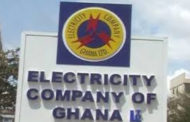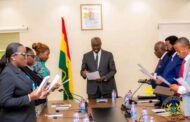Today, Wednesday 18, December 2019, the Human Rights Court will be in session for the ruling on whether that court has the right to hear the GN Savings case or refer it to arbitration.
On 30 August 2019, Dr. Papa Kwesi Nduom together with some shareholders of GN Bank/Savings filed an application at the Human Rights Division of the High Court, challenging the decision of the Bank of Ghana to collapse GN Savings and Loans Company Limited.
An application was filed by the Bank of Ghana (BoG) and the Attorney Generals Office to stop the legal action at the Human Rights Division of the High Court.
It would be recalled that in a similar case, an application filed by the BoG to stop a legal action challenging the revocation of the licence of UniCredit Savings and Loans Limited was dismissed.
The court presided over by Justice George Koomson, on 26 September 2019 described the BoG’s application for UniCredit’s legal challenge to be struck out as “misconceived”.
Hoda Holdings, the parent company of uniCredit filed an application for judicial review in the nature of certiorari, seeking an order from the High Court to quash the decision by the BoG.
“At no point did the respondents indicate to the company that the company had become insolvent and that the respondents’ decision to declare the company insolvent and subsequently revoke its licence is not based on any empirical fact but purely on deductions based on the deliberate creation of an extremely difficult financial situation to induce the company and its shareholders, including the applicant, to give in to the respondents’ malicious intentions,” the affidavit accompanying the application stated.
On the other hand, the BoG raised the issue of jurisdiction, with a case that the High Court was not the proper forum for the legal action.
Lawyers for the BoG argued that any dispute arising out of the revocation must be determined through an arbitration process and not through the court system, as stipulated in the Banks and Specialised Deposit-Taking Institutions Act.
Justice Koomson disagreed with the BoG’s position and held that the court did, indeed, have jurisdiction to hear the case.
In the GN Savings case, applicants are praying the High Court to make an order of certiorari quashing the August 16, 2019 announcement declaring GN Savings and Loans Company Limited insolvent and consequently revoking its licence to operate as a specialised deposit-taking institution.
The application wants a declaration that the licence revocation was invalid because the BoG and the Minister of Finance based their decision to revoke the licence of GN Savings and Loans, as a specialised deposit-taking entity, on woeful inaccuracies.
The BoG, the Minister of Finance, the Attorney-General and the Receiver of GN Savings and Loans, Mr Eric Nana Nipah are the respondents.
The applicants are also praying the court to hold that by the respondents’ failure to take into account the government’s indebtedness to Groupe Nduom, Gold Coast Advisors and GN Savings and Loans Limited before concluding that GN Savings and Loans was insolvent, the BoG had violated, was violating or was likely to violate the rights of the applicants and GN Savings and Loans to administrative justice, property and equality or non- discrimination.
Aside from the substantive case, the plaintiffs also filed for an order for an interlocutory injunction seeking the restoration of the savings and loans company until the determination of the substantive motion that is challenging the decision to collapse the savings and loans company.
The applicants also want the court to direct the BoG and its agents not to further interfere directly or indirectly with the rights of the shareholders, management and directors to the possession, management and control of GN Savings and Loans Company Limited’s business activities, pending the determination of the claims in the originating motion, which is challenging the BoG’s decision to collapse the savings company.
It would be further recalled that a lot of background information was already in the public domain including the following:
”On August 14th, 2017 the BoG revoked the licenses of UT Bank and Capital Bank. Ghana Commercial Bank (GCB) took over the two under a Purchase and Assumption transaction. Less than a month later on 11th September 2017, the BoG announced an increase in the minimum capital requirement for banks from GHS 120 Million to GHS 400 Million (an increase of 233%) by December 31, 2018, giving Universal banks less than 18 months to source additional funds to beef up their capital.
This, Today gathered was an unprecedented move.
To indigenous banks, this was a clear case of raising the bar high to ensure those targeted would be posted out of the banking system.
Sensing danger, some heads of indigenous banks then came together to form an “Association of Indigenous Universal Banks” to petition President Akufo-Addo to appeal to the BoG and the Economic Management Team (EMT) for at least five years to pay up the new minimum capital requirement.
The President formed a 10 member committee to examine and act on the petition by the indigenous banks. (The committee consisted of 3 members from BoG, 3 members from banks, 3 members from the Ministry of Finance and a chair from the presidency.)
The committee was formed on 17th April 2018 and tasked to submit their final report by 26th May 2018.
The indigenous banks in their 11-page petition to the president saw this new policy as out of the norm. They did not understand why the BoG would give the same deadline to them as the foreign banks. They cited previous instances where when the minimum capital requirement was raised, indigenous banks were given an average of four years to pay. In 2003 for instance, when BoG raised the minimum capital requirement, banks were given almost four years to pay up, and in 2008 they were given almost five years to settle. At other times, the payment period was even flexible for existing banks, while new entrants were required to comply immediately.
The BoG on 1st August 2018 revoked the licenses of five other banks (Construction, Beige, Royal, Sovereign, and Unibank) and transferred their assets and liabilities into a new bank called Consolidated Bank of Ghana (CBG).
This consolidation triggered “panic withdrawals” in the banking and non-banking finance sectors as customers feared for the security of their deposits. Strangely, the BoG, the Ministry of Finance and Government, in general, stood by and did nothing to calm the fears of the depositors.
On the other hand, many BOG officials and ministers of state went on the offensive, threatening closure of those banks that would not be able to raise the required additional funds. So-called investment and financial analysts also jumped in to declare the indigenous banks not fit and blots on the banking landscape. The Senior Minister advocated mergers. Yet, no assistance was offered to facilitate these mergers.
Meanwhile, shareholders of GN Bank were at the same time, Today gathered looking for funds to shore up their capital to meet the new capital requirement.
Several letters according to our sources were written to the Presidency, requesting for their help to retrieve some of GN Bank’s funds which they had used to finance some projects that were undertaken by some Ministries, Departments and Agencies (MMDAs).
Our sources further said, Dr Papa Kwesi Nduom, Chairman of Groupe Nduom once met the President, Vice President, Minister of Finance, Governor of BOG, Ministers of State and CEOs of the debtor state agencies.
Though assurances were given, the source said payments were not made.
An independent audit commissioned at the request of the Ministry of Finance resulted in the GHS2.4 billion state agency and contractor liabilities which still remain.
With the deadline for the new minimum capital fast approaching, shareholders of GN Bank, Today further gathered wrote a letter to the Bank of Ghana requesting for the bank to be reclassified as a Savings and Loans Company while steps were taken to retrieve funds from state agencies and others.
The BoG on 4th January 2019, our sources at the Ministry of Finance approved the request by the shareholders of GN Bank to be reclassified.
“Consequently, GN Bank has applied for, and the Bank of Ghana has approved the grant of a savings and loans company licence. The Bank of Ghana has also approved a transition plan submitted by GN for winding down aspects of its business which are not compatible with a savings and loans company licence,” Governor of the Central Bank”, Dr Ernest Addison revealed at their press conference on the update of the banking sector reforms.
Explaining the rationale for the reclassification to their customers and the general public, GN Bank / Savings said it would remain Ghanaian, with a national retail network, to promote financial inclusion.
“From the very beginning, our Vision has been to be a truly National Bank for the ordinary person namely; farmers, professionals, students, workers, and small and medium scale entrepreneurs in Ghana.”
“We will continue to be a financial institution with a difference – go where others are not willing to go, to bring banking to people currently excluded from the formal banking sector throughout the country,” a statement by issued by Groupe Nduom’s Corporate Affairs concluded.
Lawyers for the petitioners raised an objection over the sitting judge, Justice Gifty Agyei-Addo, who is the twin sister of Mr Samuel Atta Akyea, Minister of Works and Housing. Mr Atta Akyea who is also the Member of Parliament (MP) for Abuakwa South is the cousin to the Finance Minister, Mr Ken Ofori-Atta, who is an agent of the state and party to the suit before the court.
This symbiotic relationship between the judge, Justice Gifty Agyei-Addo and the Finance Minister, Ken Ofori Atta shareholders of GN Savings believe makes it a clear case of potential conflict of interest.
And true to their (Shareholders of GN Savings) fears, Justice Agyei-Addo ordered the applicant’s lawyer Justice Srem-Sai to strike out the Finance Minister, as a respondent to the case.
With all that is popping up in the traditional and social media recently, the independence of our regulators, Today can authoritatively report that is being questioned.
The hand of politics once hidden is now openly obvious. What is left is for the judiciary to demonstrate where it stands.
Source: Today Newspaper




















































